Certification required in Indian Cosmetic Industry for ingredient

Overview of the certifications and regulatory requirements for ingredients used in cosmetics in India
The Indian cosmetic industry is regulated by various laws and certifications to ensure the safety, quality, and efficacy of cosmetic products and their ingredients. Certification is critical for maintaining compliance with Indian and international standards, building consumer trust, and ensuring market access. Manufacturers and suppliers must adhere to national and international standards, covering everything from ingredient sourcing to testing, labelling, and environmental impact. By obtaining these certifications, companies not only comply with legal requirements but also build consumer trust and expand their market reach.
Also Read: Construction Chemicals Suppliers India
Why is Certification Essential for the Cosmetic Industry for Ingredients in India?
Certification is indispensable for the cosmetic industry in India because it ensures that ingredients are safe, legal, and high-quality. It helps brands gain consumer trust, access new markets, and stay compliant with stringent regulations. In a competitive and fast-evolving industry, certification is not just a legal requirement but a crucial factor in achieving long-term success and sustainability.
- Ensuring Consumer Safety: Certification verifies that ingredients are safe for use and do not contain toxic or harmful substances that may cause irritation, allergies, or long-term health issues.
- Building Consumer Trust: Certified ingredients assure consumers that the product is safe, ethical, and of high quality.
- Supporting Market Access: Certification is often a prerequisite for selling ingredients to established cosmetic manufacturers in India. Certifications like REACH (EU), COSMOS (Organic), or US FDA are essential for exporting cosmetic products, as they demonstrate compliance with global standards.
India is one of the fastest-growing markets for cosmetics, with its beauty and personal care industry expected to exceed USD 20 billion by 2025. This growth is fueled by rising disposable income, increasing urbanization, greater awareness of personal grooming, and the influence of social media and international beauty trends. However, with rapid expansion comes the responsibility to ensure consumer safety, product quality, and compliance with international standards.
Also Read: Top Chemical Distributors In India
Types of Cosmetic Licenses in India
The cosmetic industry in India is regulated under the Drugs and Cosmetics Act, 1940, and the Drugs and Cosmetics Rules, 1945 (amended by the Cosmetics Rules, 2020). To manufacture, sell, import, or distribute cosmetics in India, businesses need specific licenses issued by the Central Drugs Standard Control Organization (CDSCO) or State Drug Control Authorities.
- License for Manufacturing Cosmetics: If you plan to manufacture cosmetics in India, obtaining a Form 32 License is a mandatory regulatory requirement. This license ensures that your operations comply with the safety, quality, and hygiene standards established under the Drugs and Cosmetics Act, 1940, and its associated rules.
- License for Importing Cosmetics: Required for importing cosmetic products into India for sale or distribution. Issued by the Central Drugs Standard Control Organization (CDSCO). The importer must submit a detailed dossier of the product, including the list of ingredients, manufacturing details, and safety data.
- Registration Certificate for Imported Cosmetics: Before obtaining an import license, a registration certificate is needed to register the cosmetics with CDSCO. The importer must submit a detailed dossier of the product, including the list of ingredients, manufacturing details, and safety data.
- License for Sale and Distribution of Cosmetics: Required for entities engaged in selling or distributing cosmetics in India. Documentation proving compliance with storage and distribution norms.
The regulatory compliance is crucial to ensure consumer safety, quality assurance, and global competitiveness. By obtaining the appropriate licenses, manufacturers, importers, and distributors can legally operate while adhering to stringent safety and quality standards. These licenses not only safeguard public health but also build trust and credibility among consumers, facilitating long-term business success.
Also Read: Niacinamide Distributors in India
Certifications Required in the Indian Cosmetic Industry for Ingredients
Various certifications are required for cosmetic ingredients and finished products, covering both domestic and international standards. Below is a detailed explanation of the certifications necessary for cosmetic ingredients in India.
- Vegan Certificate: Vegan certification ensures that cosmetic ingredients and products are free from animal-derived components and have not been tested on animals at any stage of production. Organizations like The Vegan Society, PETA India, and Beauty Without Bunnies issue certifications.
- TDS: The Technical Data Sheet (TDS) provides detailed information about the properties, safety, and handling of cosmetic ingredients. It ensures compliance with regulatory standards and aids manufacturers in safe and effective formulation. Ensures compliance with BIS standards and The Drugs and Cosmetics Act, 1940.
- COA: A Certificate of Analysis (COA) is a document provided by the manufacturer or supplier that confirms the quality and safety of cosmetic ingredients by detailing their compliance with specific standards. Ensures the ingredient adheres to standards outlined by The Drugs and Cosmetics Act, 1940, and other regulatory bodies.
- MSDS: The Material Safety Data Sheet (MSDS) provides essential information about the safety, handling, storage, and potential hazards of cosmetic ingredients.
- COSMOS Approved: COSMOS (Cosmetics Organic and Natural Standard) certification ensures that cosmetic ingredients meet organic and natural product standards, supporting ethical, eco-friendly, and sustainable practices.
- GMO Free: GMO-Free certification ensures that cosmetic ingredients are not derived from genetically modified organisms (GMOs), supporting natural and ethical product standards.
- Plant-Based Origin: Plant-Based Origin certification ensures that cosmetic ingredients are derived from plant sources, supporting natural, sustainable, and ethical formulations.
- Upcycle Certification: Upcycle certification ensures that cosmetic ingredients are sourced from by-products or waste materials that have been repurposed into high-quality, usable ingredients, reducing waste and promoting sustainability.
- Paraben Free: Paraben-Free certification ensures that cosmetic products do not contain parabens, which are preservatives commonly used in cosmetics but are associated with potential health risks.
- Silicon Free: Silicon-Free certification ensures that cosmetic products are free from silicones, which are synthetic compounds commonly used in hair and skincare products but may have long-term environmental and skin concerns.
- Allergen Free: Allergen-Free certification ensures that cosmetic products are free from common allergens, protecting consumers with sensitive skin or allergies.
- Sustainability: Sustainability certifications ensure that cosmetic ingredients are sourced and produced with minimal environmental impact, promoting eco-friendly and ethical practices.
- Not Tested on Animals: Not Tested on Animals certification in the Indian cosmetic industry promotes cruelty-free, ethical products, aligning with consumer values and meeting regulatory standards.
- Ecocert Raw material: Ecocert certification ensures that raw materials used in cosmetic products meet high standards for organic, natural, and sustainable sourcing.
Certifications are vital for ensuring the safety, quality, and compliance of cosmetic ingredients in India. They not only protect consumer health but also enable businesses to access domestic and international markets effectively. Companies in the cosmetic industry must stay updated on evolving regulatory requirements and secure the necessary certifications to remain competitive and trustworthy.
Also Read: Titanium Dioxide Manufacturers In Delhi
Bansal Trading Company is a trusted supplier and distributor of ingredients for the Indian cosmetic industry, ensuring that all products comply with the regulatory framework established by the Government of India. The company takes great care to source and deliver high-quality cosmetic ingredients that meet the legal requirements outlined under India’s Drugs and Cosmetics Act, 1940, and The Drugs and Cosmetics Rules, 1945.
Also Read: Paint Additives Suppliers India
BTC_WEB_ADMIN






